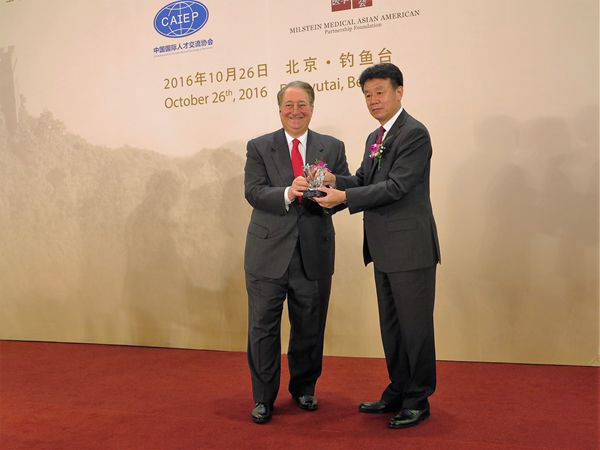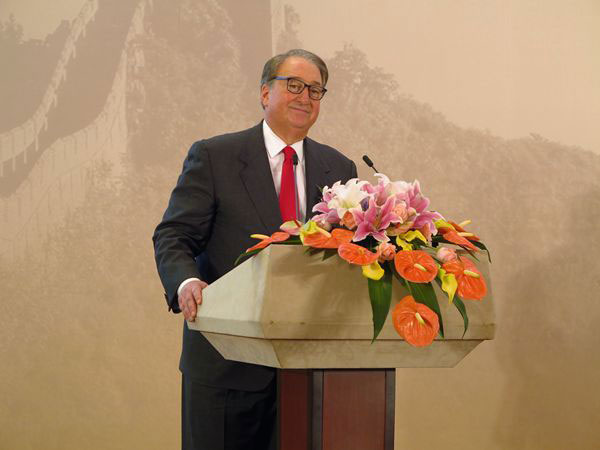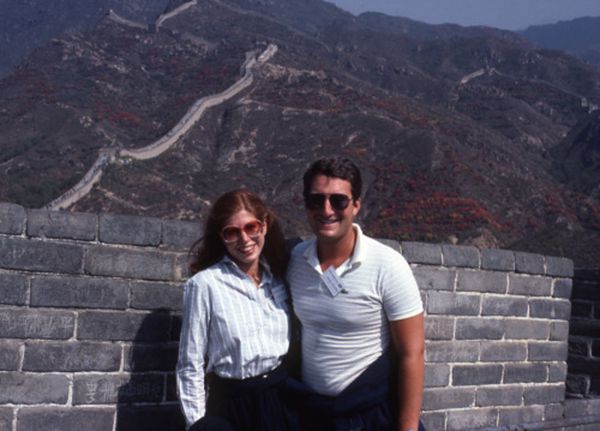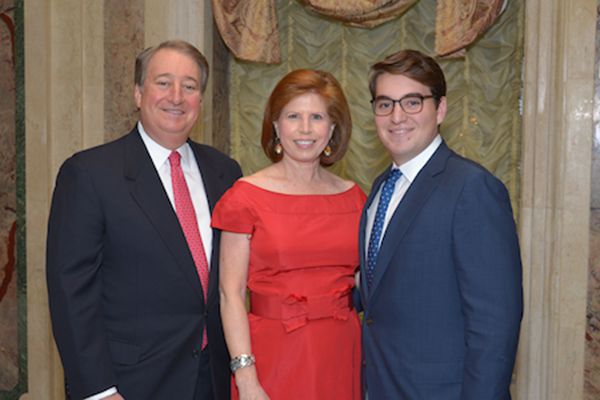Howard Milstein, chairman of the Milstein Medical Asian American Partnership Foundation, was presented with the Marco Polo Award Photo: Sino-US.com by Rebecca Lin
Howard Milstein, an esteemed American entrepreneur and philanthropist from New York, was granted the 2016 Marco Polo Award recently in Beijing for bringing together leading medical talent and institutions from China and US and funding their exchanges. Mr. Milstein established the Milstein Medical Asian American Partnership (MMAAP) Foundation in 2011, with the goal to improve world health by developing mutually beneficial partnerships between the US and China.
Since its inception, the foundation has awarded over 30 Fellowships and Project Awards with annual donations of nearly USD 1 million in five targeted medical fields — Senior Healthcare, Skin Disease, Reproductive Biology, Blood Research, and Translational Medicine.
Max Baucus, the US Ambassador to China, attended the award ceremony at the Diaoyutai State Guest House in late October. He told sino-us.com that Milstein represents the best relationship between the US and China with his attitude having improved the friendship of the two countries. “He is a leader of generosity, vision and values. People should follow him,” said Baucus.
Howard Milstein delivers the keynote speech at the awarding ceremony. Photo: Sino-US.com by Rebecca Lin
Milstein delivered the keynote speech, noting that the partnership in medical research that he’s improving on is a part of a broader partnership between the two countries, which he believes, would be the most important in the world over the next several decades. He concluded his speech with the Chinese expression Zhong Xi He Bi (中西合璧), meaning the combination of the East and West, to emphasize that “combination is always greater than individual pieces.”
The Marco Polo Award, the highest honor accorded to non-Chinese citizens, was founded in the 1990s. So far, more than 30 entrepreneurs, social activists and politicians from across the world, including former US President George H.W. Bush, have received the award. Nokia CEO Rajeev Suri won the 2015 Marco Polo Award for his company's contribution to China's network communication technology innovation.
Howard Milstein sat down with sino-us.com to talk about his family’s long-time philanthropic pursuits and their deep ties to China that have inspired him, the leader of the Milstein business and philanthropic empire’s third generation to do charity and invest in China.
Philanthropy—a family tradition
A scion of the prominent Milstein family which has a long history of charitable endeavors, 65-year-old Howard has got the sense of responsibility in his blood. At the top of his Howard & Abby Milstein Foundation’s homepage, a Winston Churchill quote is posted, “A man earns a living by what he gets; he makes a life by what he gives.” He regards the line his life motto and has lived his life up to the ideal.
Being the elder son of Irma Milstein and the legendary businessman and philanthropist Paul Milstein, Howard Milstein has been devoting considerable amount of time and energy into philanthropic initiatives as he has in his business activities.
His private charity Howard and Abby Milstein Foundation, which he and his wife run, participates actively in the charity organizations they support, typically with hands-on leadership and long-term financial support. They’ve got a focus on eight major areas: medical research, biotechnology and science, higher education, history, religious and communal organizations, arts and culture, law enforcement/homeland security, and civic engagement.
Howard especially mentioned his work as the chairman of the New York Blood Center (NYBC). “The nonprofit organization supplies blood to more than 20 million people in New York through 200 hospitals.” He also established the Howard P. Milstein National Cord Blood Center, the world's largest public cord blood bank, which has made much of the world’s cord blood research possible.
Howard and his family have successfully invested and engaged in many philanthropic projects in the healthcare and medical field, which makes him believe it is viable to set up a medical foundation based on US-China partnership. He conceived of the idea in early 2011, after meeting with officials of the Chinese Ministry of Health. In December of the same year, the framework of the MMAAP Foundation was presented to Liu Qian, the then vice minister of Health. “He enthusiastically endorsed the plan. Then, we reached agreements and began to help the premier medical institutions and most promising medical talents in our two countries to cooperate,” Milstein said.
The Milstein family is known to be long-time sponsors of health and medical-related research. Spanning more than half a century, three generations of the family have been actively involved in the cause. When asked what has prompted the urge in pushing breakthroughs in the field, Howard spoke of his grandfather Morris Milstein, the founder of Milstein business empire and a pioneer of medical philanthropy.
“In the 1950s, my grandfather met a doctor from the Columbia Presbyterian Hospital, whose name is David Habif. The surgeon performed a successful operation on my uncle, so my grandfather was very grateful. When they really got to know each other, my grandfather found that Doctor Habif worked really hard to treat his patients and do medical research. The doctor cares nothing about money. He only cares about people,” recalled Howard. Morris Milstein then decided that he would support these good people to do good things, because that’s what people successful in the private sector should do. Soon, the family became active at the hospital where David Habif worked and thus started their efforts to do medical charities.
After decades of involvement and dedication, Howard has developed his own conception about how to be effective in philanthropy. He’s a proponent of "venture philanthropy", which he defines as applying business principles, experience, and an entrepreneurial approach to philanthropic work.
He elaborated on what “venture philanthropy” means and why it is important for philanthropists. “People must keep in mind their objectives. The question is, when money goes to charity, will it be used effectively?” The only way, Milstein believes based on his rich experiences in the field, is for the person who makes and gives the money knows how to do things.
“The best way is to have experience in the private sector. If you want to be effective in the philanthropic sector, get your skills in the private sector,” he delivered a message to young people with the heart and dedication to solve social problems. Milstein warned that serving only in the public sector may deprive people of the skills and strength they need to be effective in charity. “Effective philanthropy requires planning and focus; just like in business, you must be prepared to respond to immediate human needs.”
Howard is known by his team and partners to be able to stay involved in his philanthropic projects, provide the leadership and vision, and make sure all details are handled correctly. “I would not say here is the money, let someone else do it, because they won’t do it as well as you would do it,” he said.
He pointed out some charities in the United States would use a high ratio of money they collect on themselves as opposed to giving away. “In some cases, it’s 90%. (That’s) a big bureaucracy. So, they raise money to support themselves. It’s pointless. The problem is bigger in the US than in China, and that’s something to be careful of.”
An enduring connection to China
Howard is the first one in his family to be honored a prestigious award by the Chinese government, although he is not the first Milstein to reach to China. The legendary business family has deep ties to China, which goes far back to the early years of China’s opening to the west.
In 1983, Paul Milstein, Howard’s father, then the President and principal owner of United Brands (parent company of Chiquita Brands International, Inc.) took his “Banana Trip” to China. At the time, the Chinese government was planning to develop the Hainan Island into a world-class banana production base, and so Paul Milstein, the world’s “banana king” was invited to consult the business.
Howard still remembers that his father would talk of Chinese people’s hospitality: they had sent a private jet to pick him up in Hong Kong, taken him to dine at the German embassy in Beijing, which cooked the best western food back then…In return, Paul Milstein provided his company’s expertise in planting and selling banana. Now, the booming banana farming in South China is a result of that effort.
Howard and his wife Abby on top of the Great Wall in 1980
Actually, Howard made his own connection to China several years before his father’s famous “Banana Trip”. In 1980, not long after earning both his law degree and M.B.A. from the Harvard University, Howard and his wife Abby travelled to Hong Kong, Shanghai, and Beijing. The experience made the 29-year-old westerner realize Chinese people is no different from Westerners. “Warmth, diligence, humor, pragmatism and a focus on family, these are all common traits of the Chinese and American people.”
The trip also enabled the business empire heir recognize China’s potential for business development. Now, Howard’s Nicklaus Company, jointly owned with famous golfer Jack Nicklaus, has designed more than 50 golf courses in Shanghai, Beijing and Kunming. He is also involved in numerous other activities, including ResoursePro, an insurance business with more than 1,000 employees in Qingdao & Jinan. More recently, Milstein’s business interests in China have become quite diverse and will continue to grow in the coming years.
“Investing in China is a requirement for innovative large-scale companies, because they have to compete with those that have invested and gained good results,” he said. The entrepreneurial builder of innovative big companies is especially interested in the new startups and tech accelerators now burgeoning in China. He has decided to seize the opportunities of China’s transformation from export-driven to consumption and innovation-driven economy.
The American entrepreneur also voiced his concerns about investing in China. “The main obstacle is not language, but China’s different legal and political system from the rest of the world. (It is) with independent processes for asserting ownership, that is not very clear to Westerners, especially as it works today.” Howard confessed he’s not sure about what will happen in five or 10 years. “Maybe government policy will change on what foreign companies can own. That’s really the biggest problem.”
In May, 2015, Howard was elected to the National Committee on U.S.-China Relations and will serve a three-year term as a member of the board. He observes that amid a slowing economy in the country, there has been lots of investment, “so competitively speaking, all companies need to invest.”
American Dream and family values
Howard’s family has made their “American Dream” come true through hard work, willingness to take risks and exploring new opportunities. Morris Milstein, a Jewish immigrant from Russia, could not even speak English well when he first arrived in the US. He struggled from the bottom and established his own small company called Circle Flooring in 1919. The hard-working Milsteins kept pushing their business even during the war times; by the end of the Second World War, their flooring products and services had covered the whole country of America.
Howard Milstein stands by the side of his wife Abby and son Michael
Howard’s father, Paul Milstein went one step further to venture into the real estate industry. “He thought if the Milstein’s can do part of a building’s construction, why can’t they build the entire building? That was how Milstein Properties got started.” Paul Milstein thus began the story of a real estate magnate. Through efforts of three generations, the family has so far built or bought 50,000 apartments, 20 million square feet of office space and over 10,000 hotel rooms in America.
Howard rose to the leader of the third generation by expanding the family’s businesses into banking. During the American banking crisis of 1986, he bought the 150-year old Emigrant Bank and developed it into the largest privately owned bank in the country. Meanwhile, he has acquired new assets in venture capital, computer technology and telecommunications.
Milstein said that his family would never use the history of struggles as teaching instrument; instead, they would work together with the next generation. “The same problem is facing business families all over the world — how to stimulate the next generation, include them in family business and make them understand the value of money?”
Howard is proud of his 27-year-old son Michael, who is adding new blood and tech vitality into the family. Leading the family’s No. 1 tech accelerator in New York—the Grand Central Tech, Michael Milstein is regarded by people working with him to be an unusual young man who possesses good interpersonal skills and very balanced judgment to lead talents older than him.
Howard said, just like himself, his son Michael started to work with the family from a very young age. “When he was nine, he came to me one day and said he wanted to be included in the family business.” From then on, the father and son would spend several minutes to talk about what happened in business every day. When Michael reached 16, he began to work in the Emigrant Bank’s sports division. “He wanted to join in the business, because that’s something his parents had shared with him,” Howard said.
Howard Milstein, who has set an extremely good example of the third-generation rich, knows something about China’s second-generation rich dilemma. “The situation in China is quite different, because wealth started to be accumulated again from the 1980s. People had to work really hard to gain success. It is natural that their children felt neglected. When they believe that it is professional activities that took their parents away from them, they resented it.” He noted that although what happened in China is a little bit more severe, or in an exaggerated way, the same problem is also haunting the US.
“In the US, only 15% or fewer families that created wealth still has that in the third generation,” Howard said, suggesting young entrepreneurs in China to include their children in their work lives in a continuous way because “children like to be with their parents and see what they are doing.”
“Now, if we want to have activities in tech, we would turn to Michael. We could now rely on his judgment and knowledge of how things work in the area,” the jolly father said.



